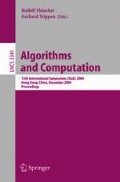Abstract
We propose a model of computation where a Turing machine is given random access to an advice string. With random access, an advice string of exponential length becomes meaningful for polynomially bounded complexity classes. We compare the power of complexity classes under this model. It gives a more stringent notion than the usual model of computation with relativization. Under this model of random access, we prove that there exist advice strings such that the Polynomial-time Hierarchy PH and Parity Polynomial-time \(\bigoplus\)P all collapse to P. Our main proof technique uses the decision tree lower bounds for constant depth circuits [Yao85, Cai86,Hås86]and the algebraic machinery of Razborov and Smolensky [Raz87, Smo87].
Access this chapter
Tax calculation will be finalised at checkout
Purchases are for personal use only
Preview
Unable to display preview. Download preview PDF.
References
Ajtai, M.: \({\Sigma_1^1}\)-formulae on finite structures. Ann. Pure Applied Logic 24, 1–48 (1983)
Alon, N., Spencer, J.: The Probabilistic Method. John Wiley & Sons, Inc, Chichester (2000)
Baker, T., Gill, J., Solovay, R.: Relativizatons of the P =? NP question. SIAM J. Comput. 4(4), 431–442 (1975)
Balcázar, J., Díaz, J., Gabarró, J.: Structural Complexity I & II. Springer, Heidelberg (1989-1990)
Cai, J.-Y.: With probability one, a random oracle separates PSPACE from the polynomial-time hierarchy. In: Proc. 18th ACM Sympos. on Theory of Comput (STOC 1989), pp. 21–29 (1986); The final version appeared. J. Comp. Syst. Sci. 38(1), 68–85 (1989)
Cai, J.-Y., Watanabe, O.: On proving circuit lower bounds against the polynomial-time hierarchy: positive and negative results. In: Warnow, T.J., Zhu, B. (eds.) COCOON 2003. LNCS, vol. 2697, pp. 202–211. Springer, Heidelberg (2003)
Du, D., Ko, K.: Theory of Computational Complexity. John Wiley & Sons, Inc, Chichester (2000)
Furst, M., Saxe, J., Sipser, M.: Parity, circuits, and the polynomial time hierarchy. In: Proc. 22nd IEEE Symposium on Foundations of Computer Science (FOCS 1981), pp. 260–270. IEEE, Los Alamitos (1981)
Håstad, J.: Almost optimal lower bounds for small depth circuits. In: Proc. 18th ACM Symposium on Theory of Computing (STOC 1986), pp. 6–20. ACM, New York (1986)
Heller, H.: On relativized exponential and probabilistic complexity classes. Information and Control 71(3), 231–243 (1986)
Kannan, R.: Circuit-size lower bounds and non-reducibility to sparse sets. Information and Control 55, 40–56 (1982)
Karp, R., Lipton, R.: Some connections between nonuniform and uniform complexity classes. In: Proc. 12th ACM Symposium on Theory of Computing (STOC 1980), pp. 302–309. ACM, New York (1980); An extended version appeared as: Turing machines that take advice, i vn L’Enseignement Mathématique (2nd series) 28, 191–209, (1982)
Kozen, D.: Indexing of subrecursive classes. In: Proc. 10th ACM Symposium on Theory of Computing (STOC 1978), pp. 287–295. ACM, New York (1978); The final version appeared in Theoretical Computer Science 11, 277–301 (1980)
Nisan, N.: Pseudorandom bits for constant depth circuits. Combinatorica 11(1), 63–70 (1991)
Nisan, N., Wigderson, A.: Hardness vs randomness. J. Comput. Syst. Sci. 49, 149–167 (1994)
Razborov, A.: Lower bounds on the size of bounded depth networks over a complete basis with logical addition. In: Mathematical Notes of the Academy of Sciences of the USSR, vol. 41, pp. 333–338 (1987)
Smolensky, R.: Algebraic methods in the theory of lower bounds for Boolean circuit complexity. In: Proc. 19th ACM Symposium on Theory of Computing (STOC 1987), pp. 77–82. ACM, New York (1987)
Wilson, C.B.: Relativized circuit complexity. In: Proc. 24th IEEE Symposium on Foundations of Computer Science (FOCS 1983), pp. 329–334. IEEE, Los Alamitos (1983)
Yao, A.C.: Separating the polynomial-time hierarchy by oracles. In: Proc. 26th IEEE Symposium on Foundations of Computer Science (FOCS 1985), pp. 1–10. IEEE, Los Alamitos (1985)
Author information
Authors and Affiliations
Editor information
Editors and Affiliations
Rights and permissions
Copyright information
© 2004 Springer-Verlag Berlin Heidelberg
About this paper
Cite this paper
Cai, JY., Watanabe, O. (2004). Random Access to Advice Strings and Collapsing Results. In: Fleischer, R., Trippen, G. (eds) Algorithms and Computation. ISAAC 2004. Lecture Notes in Computer Science, vol 3341. Springer, Berlin, Heidelberg. https://doi.org/10.1007/978-3-540-30551-4_20
Download citation
DOI: https://doi.org/10.1007/978-3-540-30551-4_20
Publisher Name: Springer, Berlin, Heidelberg
Print ISBN: 978-3-540-24131-7
Online ISBN: 978-3-540-30551-4
eBook Packages: Computer ScienceComputer Science (R0)

